Discover Sinocism Live
Sinocism Live

Sinocism Live
Author: Bill Bishop
Subscribed: 161Played: 1,283Subscribe
Share
© Sinocism LLC
Description
Bill Bishop, author of the Sinocism newsletter, chats with experts from around the world to help us all get smarter about China. Topics discussed include politics, foreign relations, business, finance, culture, history and markets. It started as a podcast but is now video too.
Nearly 400,000 investors, policymakers, executives, analysts, diplomats, journalists, scholars and others read Sinocism for valuable insights into China.
sinocism.com
Nearly 400,000 investors, policymakers, executives, analysts, diplomats, journalists, scholars and others read Sinocism for valuable insights into China.
sinocism.com
25 Episodes
Reverse
Thanks everyone who tuned into my live video with Drew Thompson. Drew is now based in Singapore as a Senior Fellow at the S. Rajaratnam School of International Studies (RSIS) at Nanyang Technological University.From 2011-2018 he was the Director for China, Taiwan and Mongolia in the Office of the Secretary of Defense. In 2012 he planned and organized a visit to the US of a delegation led by then-Defense Minister General Liang Guanglie. Zhang Youxia was part of the delegation.We had a great discussion about his personal experience shepherding Zhang Youxia around the US many years ago, his work on US-China military-to-military relations, and the disappearance in 2023 of South China Morning Post reporter Minnie Chan.Drew wrote about his experience with Zhang in the excellent The demise of Zhang Youxia hits different. You can and should subscribe to him @ Drew ThompsonThanks. This is a public episode. If you'd like to discuss this with other subscribers or get access to bonus episodes, visit sinocism.com/subscribe
This is a recording of my November 20, 2025 discussion with Sheena Chestnut Greitens ( Sheena Chestnut Greitens), Isaac B. Kardon (CHINA: Threat or Menace on Substack), and Cameron Waltz about their excellent and important new paper China’s Foreign Police Training: A Global Footprint - Carnegie Endowment for International Peace.I learned a lot from the paper and the conversation, and we had a good discussion at the end about whether or not China is using this security cooperation and training to export its governance model.From the summary of the paper:Global outreach by China’s internal security agencies is expanding. As China’s Global Security Initiative externalizes a concept of security focused on domestic stability and regime protection, the People’s Republic of China (PRC) has increased its efforts to train and build capacity among foreign law enforcement and internal security forces around the world, including across Asia, Africa, and Latin America. Foreign police training is one of the most concrete and measurable outcomes associated with the Global Security Initiative, as President Xi Jinping and other Chinese leaders have publicly committed to training thousands of foreign security officers in multiple high-profile appearances.This paper examines China’s foreign police, security, and paramilitary training from 2000 to 2025. It draws on an original new dataset of nearly 900 trainings provided to at least 138 countries and places these trainings in the wider context of Chinese soft power, foreign policy objectives and projects such as the Global Security Initiative, broader patterns of Chinese security engagement, and Beijing’s narratives about China’s role as a global security provider.You can read the whole paper here.Earlier this year they published A New World Cop on the Beat? China’s Internal Security Outreach Under the Global Security Initiative.If you prefer to consume the Sinocism Live episodes as a podcast, please add this URL to the podcast player of your choice:https://api.substack.com/feed/podcast/2/s/7556.rssYou can also listen to it in the app:Thanks for watching/listening. This is a public episode. If you'd like to discuss this with other subscribers or get access to bonus episodes, visit sinocism.com/subscribe
This is a recording of my October 31, 2025 discussion with Ruixue Jia and Hongbin Li about their excellent and important new book The Highest Exam - How the Gaokao Shapes China.From a synopsis of the book:In The Highest Exam, authors Ruixue Jia, Hongbin Li, and Claire Cousineau present a sweeping, data-rich account of China’s exam-centered education system — a “centralized, hierarchical tournament” culminating in the Gaokao, a grueling three-day college entrance exam. Drawing on decades of empirical research and lived experience, Jia and Li — both leading economists who took the Gaokao and later taught at top universities in Beijing, Hong Kong, and the U.S. — reveal how this state-managed system shapes education, labor markets, political legitimacy, and social values.You can buy the book here: The Highest Exam - How the Gaokao Shapes China. It is well-written and priced like a normal book, not an academic one. You can not understand China without understanding the Gaokao system, so this is an important and very useful book.If you prefer to consume the Sinocism Live episodes as a podcast, please add this URL to the podcast player of your choice:https://api.substack.com/feed/podcast/2/s/7556.rssYou can also listen to it in the app:Thanks for watching/listening. This is a public episode. If you'd like to discuss this with other subscribers or get access to bonus episodes, visit sinocism.com/subscribe
This is a recording of my October 30, 2025 conversation with Rush Doshi, the C.V. Starr senior fellow for Asia studies and director of the China Strategy Initiative at the Council on Foreign Relations (CFR) and an assistant professor in Georgetown’s School of Foreign Service.Rush Doshi was deputy senior director for China and Taiwan on President Joe Biden’s National Security Council (NSC), where he served from 2021 to 2024 and helped manage the NSC’s first China directorate.During his time in the Biden Administration he worked on multiple Biden-Xi engagements, so I thought he would be a great guest to help us parse through the Trump-Xi meeting in South Korea and what it means for US-China relations. He did not disappoint.Rush is about to launch a new Substack called “The Great Changes 大变局. You can and should subscribe to it here.You can catch up with many of Rush’s recent writings and podcast appearances here on his CFR page.Thanks for watching/listening. This is a public episode. If you'd like to discuss this with other subscribers or get access to bonus episodes, visit sinocism.com/subscribe
This is a recording of my October 24, 2025 conversation with Chris Johnson, CEO of China Strategies Group and a former top China analyst at the CIA, about the recently concluded Fourth Plenum, and specifically the ongoing purges in the PLA, and US-China relations ahead of next week’s Trump-Xi meeting in South Korea.Chris wrote a guest piece for Sinocism earlier this week on Xi and succession - Forever Xi Jinping? Perhaps Not.If you prefer to consume the Sinocism Live episodes as a podcast, please add this URL to the podcast player of your choice:https://api.substack.com/feed/podcast/2/s/7556.rssYou can also listen to it in the app:Thanks for watching/listening. This is a public episode. If you'd like to discuss this with other subscribers or get access to bonus episodes, visit sinocism.com/subscribe
This is a recording of my October 16, 2025 conversation with Ambassador Mike Froman Mike Froman about recent developments in the US-China trade war and US-China relations in general. I learned a lot from this conversation and I think you will as well.Ambassador Froman is president of the Council on Foreign Relations (CFR), and has had a distinguished career in the private sector and in public service, including as the head of USTR from June 2013 to January 2017. He now writes a weekly newsletter called The World This Week, to which I encourage everyone to subscribe. We also discussed some of his recent writings, including:After the Trade War: Remaking Rules From the Ruins of the Rules-Based System - Foreign AffairsChina Has Already Remade the International System - Foreign AffairsChina, the United States, and the AI Race | Council on Foreign RelationsThanks to everyone who watched our chat live. This is a public episode. If you'd like to discuss this with other subscribers or get access to bonus episodes, visit sinocism.com/subscribe
This is a recording of my October 14, 2025 conversation with Charles Parton about the recent UK-China spy case and UK-China relations in general. Charles Parton OBE is the Chief Advisor to the China Observatory at the Council on Geostrategy. He spent 22 years of his 37 year diplomatic career working in or on China, Hong Kong and Taiwan. In his final posting he was seconded to the EU Delegation in Beijing, where, as First Counsellor until late 2016, he focussed on Chinese politics and internal developments, and advised the EU and Member States on how China’s politics might affect their interests.You can follow Charlie on Substack @ Charles Parton.Thanks to everyone who watched our chat live. This is a public episode. If you'd like to discuss this with other subscribers or get access to bonus episodes, visit sinocism.com/subscribe
Thanks everyone for tuning into my live video with afra Wang and Jasmine Sun. We had a great conversation about their recent trip to China, the differing views of AI in the US and China, and the ongoing narrative/vibe shift about China. I highly recommend their newsletters, and specifically the two essays that prompted this discussion:Afra Wang - Topology of "China AI"Jasmine Sun - America Against China Against America This is a public episode. If you'd like to discuss this with other subscribers or get access to bonus episodes, visit sinocism.com/subscribe
This is a recording from the September 4th live conversation I had with Professor Joseph Torigian about his excellent book on Xi Jinping’s father - The Party's Interests Come First - The Life of Xi Zhongxun, the importance of history to the Party, and to Xi Jinping, and how we might view the recent commemoration of the 80th anniversary of the “Victory in the Chinese People’s War of Resistance Against Japanese Aggression and the World Anti-Fascist War”. This is a public episode. If you'd like to discuss this with other subscribers or get access to bonus episodes, visit sinocism.com/subscribe
On July 22nd I spoke with Finbarr Bermingham, Brussels-based senior correspondent for the South China Morning Post whose beat includes EU-China relations. He has in a roll with scoops about EU-China relations, including China tells EU it does not want to see Russia lose its war in Ukraine earlier this month.He explains what to expect from the EU-China summit that convenes July 24th, and how EU-China relations have deteriorated over the last several months. Apologies, we had some technical difficulties at the start and briefly a few minutes in.He is active on Substack Notes Finbarr Bermingham This is a public episode. If you'd like to discuss this with other subscribers or get access to bonus episodes, visit sinocism.com/subscribe
On Wednesday, July 3rd I hosted Robin J Brooks for a discussion about the RMB. Robin is a Senior Fellow at the Brookings Institution, and formerly Chief Economist at the IIF and Chief FX Strategist at Goldman Sachs. He writes an excellent and free Substack which I highly recommend.Some of Robin’s views may be controversial to some, especially his argument that the PRC has more leverage over the US in the trade war because it was the very slight devaluation of the RMB against the USD just after the April 2nd tariff “Liberation Day” that was the proximate cause of the US bond market going “yippy”, which ultimately forced President Trump to back down. We had a good back and forth on that topic.I learned a lot from the whole conversation and I think you will too. And if you enjoyed it please “like” it and restack it on Substack, and send to your friends and contacts. Thanks for watching. This is a public episode. If you'd like to discuss this with other subscribers or get access to bonus episodes, visit sinocism.com/subscribe
On Wednesday June 25th I hosted a discussion with Lisa Hanson and Daniel Ahmad of Niko Partners about the China video game market and how Chinese game firms are going global This is a public episode. If you'd like to discuss this with other subscribers or get access to bonus episodes, visit sinocism.com/subscribe
Thanks to everyone who joined the live discussion today.This is a recording of a June 9th, 2025 Sinocism Live conversation with Tu Le, Founder and Managing Director of Sino Auto Insights.We had a wide-ranging conversation about the state of the EV market in China, the recent BYD price cuts,Tesla’s China prospects, autonomous driving and the prospects for legacy car makers globally.If you are interested in EVs, China and globally, you should sign up for the free weekly Sino Auto Insights newsletter.Thanks. This is a public episode. If you'd like to discuss this with other subscribers or get access to bonus episodes, visit sinocism.com/subscribe
I joined Jonathan V. Last on his show at The Bulwark to chat about China and the Trump Administration. This is a public episode. If you'd like to discuss this with other subscribers or get access to bonus episodes, visit sinocism.com/subscribe
Thanks to everyone who joined the live discussion tonight.This is a recording of a March 20th, 2025 Sinocism Live conversation with Jonathan Czin, now the Michael H. Armacost Chair in Foreign Policy Studies at the Brookings Institution, and before that was for many years at the CIA as one of the US intelligence community’s top China experts. He was director for China at the National Security Council from 2021 to 2023, where he staffed all of President Biden’s interactions with President Xi.I learned a lot from Jonathan Czin in this conversation and I think you will too. His recent work:What Beijing wants from a US-China trade war - BrookingsBurying Deng: Xi Jinping and the Abnormalization of Chinese Politics - China Leadership MonitorThoughts on the political demise of Miao Hua - BrookingsAbetting competition, restraining Beijing: Recommendations for diplomacy toward China - BrookingsAnd his bio:Jonathan A. Czin is joining the Brookings Institution as the Michael H. Armacost Chair in Foreign Policy Studies and a fellow in the John L. Thornton China Center. He is a former member of the Senior Analytic Service at CIA, where he was one of the intelligence community’s top China experts.Czin led the intelligence community’s analysis of Chinese politics and policymaking, playing a central role in assessing and briefing senior policymakers on President Xi Jinping, his rise to power, and decisionmaking on an array of key issues and crises. From 2021 till 2023, he was director for China at the National Security Council, where he advised on, staffed, and coordinated White House and inter-agency diplomacy with the People’s Republic of China, including all of President Biden’s interactions with President Xi, and played a leading role in addressing a wide range of global China issues.He also served as advisor for Asia-Pacific security affairs in the Office of the Secretary of Defense, and overseas at a CIA field station in Southeast Asia. Czin holds a master’s in international relations from Yale University, graduated magna cum laude from Haverford College, and studied at Oxford University. He is proficient in Mandarin Chinese. This is a public episode. If you'd like to discuss this with other subscribers or get access to bonus episodes, visit sinocism.com/subscribe
I had a good conversation this afternoon with Chris Cillizza about what may happen in the next few hours with TikTok Us, and how President-elect may try to undo the ban. we also chatted a bit about what US-China relations may look like in the Trump 2.0 Era.Join me for my next live video in the app. This is a public episode. If you'd like to discuss this with other subscribers or get access to bonus episodes, visit sinocism.com/subscribe
Thanks to everyone who tuned in live to my Friday discussion with Christopher Johnson on China and the US election. Our talk was part of the ongoing Substack Election Dialogues. Chris is President and CEO of China Strategies Group. He served for nearly two decades in the United States Government’s intelligence and foreign affairs communities. In addition to his work advising multinational corporations on their business and commercial strategies in China and greater East Asia, his insights on the Chinese leadership and on Beijing’s economic, commercial, foreign and security policies are regularly sought by senior Administration, Congressional, military, and foreign government officials. Chris also serves as a Senior Fellow on Chinese Politics at the Asia Society Policy Institute's Center for China Analysis.The live videos are first available in the Substack app, and that is also where you can find me most days on Notes and in the Sinocism chat:I hope you enjoy this discussion, let me know if you think I should do more.Thanks This is a public episode. If you'd like to discuss this with other subscribers or get access to bonus episodes, visit sinocism.com/subscribe
In this episode of the Sinocism Podcast Bill speaks with Tu Le, Founder and Managing Director of Sino Auto Insights. Tu recently attended the Shanghai Auto Show. We discuss the rise of China EVs both inside China and increasingly in other countries, and especially of BYD, why the legacy foreign auto manufacturers are struggling and will continue to struggle in China, and how “China EV Inc” will win share in many overseas markets. We also discuss Tesla’s positioning in the PRC and some if its challenges ahead, especially from BYD, both inside the PRC and in other markets around the world.Links:Sino Auto InsightsSino Auto Insights newsletterDoug DeMuro reviews the BYD Han:The BYD Song L:Transcript:[00:00:00] Bill: Welcome back to the Sinocism podcast. Today we're very lucky to have Tu Le to talk about the PRC auto industry. Tu is the founder and managing director of Sino Auto Insights. Tu recently relocated to Detroit after many years in Beijing. Tu and his team at Sino Auto Insights do advisory and market research work for companies and investors who want to understand the PRC auto industry and especially the rise of Made in China EVs. He also writes an excellent weekly newsletter and does a podcast and occasional or weekly, I think, , Twitter spaces. I will put links to those in the show notes. Tu, welcome and thanks for joining the podcast. Great to see you again.[00:00:36] Tu Le: Bill first. , thanks for having me. Last time we saw each other, I think we were at Central Park having a coffee at Jamaica Blue. That quite a few years ago.[00:00:47] Bill: Tu and I are old friends from, from Beijing. , so, and, and it's, it's good to see you and, , nice to have you, , back in the US and Detroit. , Detroit is home, right. But it's also a great place to be if you're working on the auto industry.[00:00:59] Tu Le: Yeah. It's kind of ground zero for what's happening in the EV and mobility space. So, so it's, it's a great time to be back.[00:01:05] Bill: I've been really wanting to get you on the podcast for a while and I got finally motivated to do so after reading, what you were talking about from the Shanghai Auto Show, which you were, you, you just came back from China, I think, like a week ago, right? You're there for Tu or three weeks, , and nice to be able to travel again, right?[00:01:21] Tu Le: Oh, man. It was, , it was kind of, , surreal because the last time I traveled internationally from China, we were just, we had bags packed and everything, so a little bit different.[00:01:35] Bill: Yeah, no, much, much better. , and I think, you know, the Shanghai Auto Show clearly rocked a lot of people's worlds, and so Tu is going help us understand what's going on, and that's why, you know. So I wanna start though, first with, if you could just tell us a little bit about yourself and how you ended up in China, working in the audio industry and, and what your firm does.[00:01:54] Tu Le: Okay, sure. So, as you'd mentioned, I grew up in Detroit, actually in Pontiac, Michigan.. In my entire family, all eight of us have worked. In the automotive space, along with our significant others. And, my first job, actually out of undergrad at Michigan State University was working at GM where the recently canceled Bolt is manufactured.[00:02:16] Tu Le: After grad school I moved to Silicon Valley, worked there for about six, seven years., and I met a girl and chased her over to Beijing actually. So I quit my Silicon Valley job and what I thought was going be a three or four year commitment ended up being 13 years. I had moved to Shanghai, took a job with Ford in Lujiazui actually for about a year, and then moved back to Beijing due to some family stuff going on.[00:02:46] Tu Le: And, then I started freelance consulting and worked at a couple of Chinese e e e-commerce startups in Beijing. And then I got pulled over to do some freelance consulting because one of my, friends. Had found out that I had some automotive background and, you know, Mercedes, BMW and Audi, they're all located, and VW group are located in Beijing.[00:03:09] Tu Le: And so I started Sino Auto Insights because, you know, right around 2014, 2015, where, you know, at ParkView Green, Tesla had opened the first retail store for China. And so I really started seeing, a shift in what was going on in the space and, a lot of articles and a lot of bad takes. So I started the newsletter, started the consultancy, because of my experience in Detroit, Silicon Valley and China with startups.[00:03:37] Tu Le: It's been quite an adventure and we, what we do is we, , , , we're a management consultant consultancy that helps mobility companies enter markets, develop products, raise capital and build their brand and work with them to find customers. And so we were focused primarily in the China market, but now we've kind of expanded because China, EV Inc.[00:04:05] Tu Le: Has expanded. And with the Inflation Reduction Act, we've recently opened a Detroit office and are, are starting to help companies here expand into the EV space and the mobility space.[00:04:20] Bill: Oh, that's fascinating. And I just, just to your, like what you mentioned about the, Tesla dealership at, or the, the showroom at, at the phone call the Parkview Green. ,I actually, you know, we both, we lived near there. Our, my kids went to school next to it, I think years went to Fangcaido, right.[00:04:35] Tu Le: That's right, exactly. I live right next door,[00:04:37] Bill: you go.[00:04:38] Bill: Right. And so, and so I went there right after it opened with a friend with a, with a friend of mine from Henan who had like, he had a a, a couple of 730s and a BMW very, you know, had like cars had, could buy what he wanted. And it was really fascinating because he wanted to buy a model S right early on.[00:04:54] Bill: And he got in there and he's like, God, it's like, it's, it's just so bare bones that does not, you know, so he didn't buy it because he's just like, this is like, not this just, I wanted like a German luxury car.[00:05:06] Tu Le: and it was over $120,000[00:05:08] Bill: No, they were, they were quite expensive. I mean this was early, early days. Right. And obviously Tesla's done well since then, but it was just really interesting how when they entered the market, they were not at all focused on, I mean, they were, they were, they had a, a brand image, but actually inside the cars, the way they were appointed was not near what sort of Chinese luxury buyers were used[00:05:29] Tu Le: right, and, and I would venture to guess, your friend was probably a little bit older,[00:05:35] Bill: Hey. It was, it's like 40 at the time.[00:05:37] Tu Le: Okay. So he is pretty young because the digital natives, and, and we'll get into this a little bit later, but the digital natives are the ones that are really looking at the safety and the connected vehicle.[00:05:48] Bill: And the, and the screens that make it look like you're, like at a currency trading station, right.[00:05:52] Tu Le: oh, yo. Yeah.[00:05:53] Bill: I want to jump to something that you wrote in your, your latest, , newsletter, , which is excellent. Everyone subscribed to it. And I will link to it, as I said earlier.[00:06:04] Bill: , but the one, the one about the Shanghai Auto Show, so you wrote. In 20, 30, 50 years from now, we'll likely point to Aha Shanghai TW 2023 as that watershed moment. It's the moment most media outlets acknowledge that the foreign legacies that dominated the China auto market for the last 35 years or so have been overtaken and unable to compete with the EV products launched by China, EV, Inc.[00:06:31] Bill: Within just the last few years, the legacies haven't given up by any means, but the writing is on the wall. BYD overtook Volkswagen as China's best selling brand in, first quarter 2023, the first time it's ever happened, BYD has no plans of giving up that title for the foreseeable future and are likely only only going to pull away even further.[00:06:53] Bill: China will never be like it was again, where brand heritage and being foreign gave you an advantage.” So if you're a foreign auto manufacturer…the sense I got from talking to some people reading the media was the foreign, some of the foreign execs who went to the auto show were shocked.[00:07:16] Bill: And so like, like what do they do? And more importantly, how did they fall behind so quickly? Right? I mean, they have had massive operations in China for decades. Didn't they have a flow of information that helped them understand how the market was changing?[00:07:30] Tu Le: So there's a few different things going on here, Bill. I think that the fact that most executives outside of the top management haven't been able to travel to China in three and a half years really limited their ability to kind of see and feel the differences and the changes. I was in China for most of that three and a half years.[00:07:56] Tu Le: And I saw the proliferation of green plates over the last few years. ,[00:08:01] Bill: just to be clear green, green plates, or if you have an EV[00:08:05] Tu Le: Right. You and I lived in Beijing during the worst pollution days, and so it was kind of a necessary evil and what, what we'll likely see in India in the future, but that's another subject, and so for them to first be able to land in Shanghai as an international business, travel, see all the green plates from the fleet vehicles and the taxis and then all the way to the passenger vehicles when you get into Jing’An temple area and stuff like that, I think that really shocked them.[00:08:42] Tu Le: And then to go to the media days on Tuesday and Wednesday, the first days you could actually see, touch and feel the vehicles. You know, they, they close, they make that sound like German cars and the, the fit and finish is much, much better than it was 5, 6, 7, 8 years ago. And so you could always tell the European or German executives, because the uniform, they wear that suit with no tie, white s
It is my pleasure to be able to run an excerpt from Tania Branigan’s excellent new book “Red Memory: The Afterlives of China's Cultural Revolution”. Tania has also kindly recorded herself reading this chapter, so you can listen to it if you prefer. Tania writes editorials for the Guardian and spent seven years as its China correspondent, reporting on politics, the economy, and social changes. we overlapped in Beijing and became friends. We also recorded a podcast about the book which you can listen to here. You can purchase the book on bookshop.org or on Amazon. The audio edition will be available from Tantor starting 7/11/23 wherever audiobooks are sold.Begin excerpt:Chapter 5Chongqing saw some of the era’s fiercest fighting, with the rift between Red Guards descending into warfare. The Kuomintang had made it their capital while battling the Japanese occupation, and it was home to multiple munitions plants; when armed struggles broke out in 1967, the military backed one side and helped its fighters seize what they needed. The factions battled with grenades, machine guns, napalm, tanks and ships upon the river – everything except planes, a resident recalled.They executed in cold blood too: even the injured, even the pregnant. Tens of thousands fled the city and at least twelve hundred people died, though the true toll was probably much higher. Some were caught in the violence by chance, like the eight-year-old killed by a ricocheting bullet as he played on the street. The others were not so much older, and you could blame chance there too, even if they saw themselves as soldiers. They never thought it would be so serious, that people would die, that so many would die. By the time they saw their friends fall they’d been battling for hours. They were numb; none of it seemed possible. Had it really happened at all?Shapingba Park held the proof. More than five hundred of the victims, mostly teenagers, were buried here, at a Red Guard cemetery hidden on one edge of the site, behind a grove of trees. It was the only Cultural Revolution site in the country to be recognised as a national heritage spot. But a mossy wall surrounded the plot and the public were not allowed in any more. I had come before, and stared through the chained gates. Though the cemetery was only half a century old, it reminded me of the Civil War graveyards I had seen in the American South, crumbling and overgrown. Luxuriant greenery crawled over marble monuments, immense and once stark white but now lichened and grey. Stone torches topped great pillars and obelisks, carved with red stars and Maoist slogans and the number 815. It was the rebel faction the dead had belonged to, named for a critical date in its inception in 1966.‘People began to die on 1 July 1967. On the tenth, I was put in charge of the bodies,’ Zheng Zhisheng recalled. He ran a chemicals business in the city, but back then he had been a student, and they had called him the Corpse Master. He was peering through thick tortoiseshell glasses that still bore the maker’s sticker. Two more dusty pairs lay on his desk, jumbled with books, newspapers, a giant magnifying glass and two lidded porcelain cups. He delved for a photograph. ‘This is October 1967. Twenty-seven people – twenty-seven corpses.’ Most of the faces were turned away from the camera. One mouth gaped so wide it could swallow the viewer.‘I had seen dead bodies when I was young. But I’d never had to handle them. I was a model student, and the faction leader thought I was a helpful person and not afraid of hard work. And also,’ he added, after a moment’s thought, ‘I’d opposed him at the beginning. So he thought of me and put me in charge. I was forced to do it. I put make-up, and an armband, and a Mao badge, on each one. At the start I was afraid of the dirty work. I had to wash the dead bodies and I used soap to wash my hands all the time. Afterwards I didn’t mind about that. The second thing was the smell. The dead bodies stank and I wanted to throw up. The third thing was ghosts – I thought ghosts were terrifying. Although I was an atheist, China had these traditional ideas, and so I was afraid.’He foraged for another handful of photographs and showed me a bobbed, full-cheeked young girl. ‘She was the first I dealt with. We used formaldehyde. She went to help the injured on the battlefield and when she stood up she was shot dead. She was sixteen.’ He reached for another. ‘This one is from the university – people were buried there too, but the monument was destroyed later. Now it’s all flower beds.’ He replaced the pictures amid the clutter.‘I felt they were martyrs and it was a waste for them to die so young. After people in our faction died we treated the others as enemies and hated them. So when we captured them, some of them were stoned until they were unconscious. Then they were sent to hospital. Afterwards we moved them to another hospital – but that was just an excuse. On the way we beat them to death; that’s why we ended up in prison. Back then we hated the Fandaodi faction but now I think both factions were cheated. They were all innocent. They were all victims.’The Fandaodi prisoners, already injured, had been battered with rifle stocks. By him?‘No, no.’ He shook his head. ‘It was two other people.’You ordered them to do it, I’d heard?‘Yes.’ He was concise, not curt. ‘I didn’t feel any sadness: I just wanted to take revenge. The other faction had killed our martyrs. I didn’t know them – it was factional.’Zheng and others had been jailed for years for their role in the armed conflict. After release he wanted to search for the victims’ families and make amends, or try to. But someone warned him that the parents might sue, and he gave the idea up. ‘It’s a lifelong nightmare. It’s very traumatic. I have nightmares that I’m still in prison. Afterwards I tried to work hard and to reconcile myself with what I had done. I tried to do good things, and when I stumbled I stood up and carried on. I cried many times.’But the lessons he had learned were priceless, he insisted, though he struggled to define them. A slight sigh escaped him, as if he was hoping I might abandon the subject. ‘It can’t be described in a few words. For foreigners, looking at the Cultural Revolution is like reading a difficult book. It’s really hard to understand. Even young people don’t have an interest.’He was afraid of what might happen if people did not face up to the past and that later generations might echo the mistakes his had made. It was not a repeat of the Cultural Revolution itself he feared – history had progressed, he said. So what was it?‘Turmoil.’ He stopped there, considering.‘For example, with the Tiananmen Square incident – I actually wrote to my son, because he was at university. Because I had that turbulent past, I didn’t let him join them. The students were patriotic. They wanted to fight against corruption. But they were being used by bad guys.’ It took me a moment to understand. He spelled it out: ‘They were manipulated by people like Fang Lizhi, Wu’er Kaixi and Wang Dan, who were pursuing Western large-scale democracy. We can only be led by the Communist Party. We can’t have big democracy like the Americans. It can only bring turbulence and chaos. We had more than two thousand years of feudalism; America started with two parties and democracy. Foreigners can’t understand China; they can’t understand China’s past. Corruption is caused not by one-party rule but by who has checks on the leadership. We can’t get rid of the Party’s rule – impossible. We don’t need any turbulence and chaos.’It was a common view in China, even among relative liberals. The country was not ready to be free; though how it might ever become so, if not allowed to evolve, was never explained. For Zheng, individual caprice and disobedience, pride and egotism had produced this disaster. Stability and the common good were all.Those at the top, such as Deng and Xi’s father, had been forced into a reckoning too. They had suffered, and watched the torment of loved ones. They had lost their oldest friends and their glorious dream of a better, happier China. When they reclaimed power, they did all they could to prevent another disaster. For their own sake, and that of the masses, they committed themselves to stability. They determined that never again would a strongman ride roughshod over his peers, his country and the people. Though Deng would dominate until his death, they did their best to institutionalise and, especially, collectivise rule. After the protests of 1989, which were fuelled by obvious divides in the leadership, the determination to avoid public splits was absolute. It is not hard to imagine the emotions engendered by millions of young people massing in Tiananmen Square again: the cold instinct for survival, the ruthlessness born of the revolution, for which they had already sacrificed so much – but, too, the visceral fear of where it could all lead.The Party adopted unwritten rules to ensure that no one outstayed their welcome, limiting top leaders to two five-year terms and setting a retirement age. Even misdemeanours were handled in line with an unofficial code: members of the politburo might be purged for corruption, but the most senior figures of all – the Politburo Standing Committee – were untouchable, as were their families. You survived and thrived by cultivating patrons and your wider networks. The Party became safer, stabler, calmer and duller.For years, it worked. China prospered. People who might have eaten meat once a year dropped unctuous pork into their bowls each week. People who might never have left their county journeyed to Shanghai, Bangkok or Paris for shopping and sightseeing. They got their hair permed, wore bright sweaters and Nikes, tried red wine and McDonald’s, took up hobbies. It was attractive enough for foreigners to speak of the ‘Beijing model’. But there was a price. Corruption was endemic. To get your child into
Episode Notes: Tania Branigan and I discuss her excellent new book “Red Memory: The Afterlives of China's Cultural Revolution”. Tania writes editorials for the Guardian and spent seven years as its China correspondent, reporting on politics, the economy, and social changes. We overlapped in Beijing and became friends. I have also published an excerpt from the book here. You can purchase the book on bookshop.org or on Amazon. The audio edition will be available from Tantor starting 7/11/23 wherever audiobooks are sold.Links:China's Cultural Revolution remembered by artist Xu Weixin - video | The Guardian2012 - China's Cultural Revolution: portraits of accuser and accused | The GuardianXilin Wang: Music by a Survivor | Hamburg International Music Festival - YouTubeWang Xilin ( 王西麟 ): Yunnan Tone Poem (1963) - YouTubeTranscript:[00:00:00] Bill: Welcome back to the occasional Sinocism podcast. I know I've been absent for a while, and now that I do the Weekly Sharp China podcast, I've realized I like podcasting. So we'll be recording more Sinocism episodes with guests I think are really interesting.[00:00:11] Bill: Today. We are very lucky to have Tania Branigan to talk about her excellent new book Red Memory: The After Lives of China's Cultural Revolution. As Tania writes, it is impossible to understand China today without understanding the Cultural Revolution. That is something I agree with wholeheartedly. So much so that I even wrote my grad school thesis on Mao badges.[00:00:30] Bill: I will also be running an excerpt from her book in the coming days, which is released in the UK already and will come out on May 9th in the United States. Tania writes editorials for the Guardian and spent seven years as its China correspondent reporting on politics, the economy, and social changes.[00:00:45] Bill: She lives in London. Welcome Tania, and congratulations on this great book. [00:00:50] Tania: Thank you so much for having me on.[00:00:51] Bill: Oh, it's my pleasure. It's great to see you. It's been it's been a few years and I appreciate it. I got an advance read of the book last year and it [00:01:00] really is it really is, I think, an important book and an important contribution.[00:01:03] Bill: So can you, just for the listeners, can you just talk a bit about your background? So when you first started working in China and what you did when you were there. [00:01:12] Tania: So I came out to China in 2008 just ahead of the Olympics, right at the start of what turned out to be an incredibly news packed year, as you may recall, right?[00:01:22] Tania: And I had never particularly wanted to be a foreign correspondent per se, but I just felt that China was the story of our time, really. Which is only proof to be truer perhaps as time has gone on. And because it's a pretty small bureau there were never more than two of us, max. And quite often there was one of me, I was covering absolutely everything.[00:01:44] Tania: So from natural disasters through to politics, through to culture, business even very occasionally when I couldn't help hit sport. But I became particularly fascinated by this topic and by [00:02:00] China's more recent history, [00:02:02] Bill: one question on your time there. When you arrived, was it already past the Wenchuan earthquake?[00:02:07] Tania: No. And in fact that was one of the sort of formative moments, for me reporting on, yeah, [00:02:15] Bill: it's 15 years next in two weeks. It's crazy. [00:02:18] Tania: It's hard to believe it's gone past so fast. I still think about those parents who lost kids. [00:02:24] Bill: And that, no, it's terrible. Terrible [00:02:29] Bill: So what led you to this book?[00:02:33] Tania: You did actually, as I say in, as I say in the book, I probably wouldn't have written it without you. So I was obviously aware of the Cultural Revolution. I knew something about it. I'd read a little around it. But then it was just when I had that lunch with you and then over coffee, you started telling me about your father-in-law and about going to try to find his body, which I feel is probably a story actually [00:03:00] at this point, that you should.[00:03:00] Tania: Tell rather than me. [00:03:02] Bill: And just for listeners the, I actually tried to have my wife be a special guest but she didn't want to do it, but Tania has interviewed her. I'll put a link in, into the story. I think we you did that great story about the artist Xu Weixin 徐唯辛, which maybe we can talk about too.[00:03:20] Bill: But no, sadly, my. Like many Chinese families people had horrible experiences in the Cultural Revolution. My father-in-law killed himself in 1967 1968 when my wife was like a year old, a year and a half old. And it, it just, it was a, he did it in Miyun outside of Beijing and involved a train.[00:03:47] Bill: And so we went. We had a family member a brother of his who was dying, who came back to say goodbye, and the family went out to this train embankment with this idea that maybe they could dig up the [00:04:00] bones and no one could figure out remember where it happened. Someone went to the village and found an old lady who remembered, and the old lady's warning was just be careful because that time that year, a lot of people jumped in front of train.[00:04:15] Bill: So just make sure you get the right bones. It was just like, oh my God. It was just like this collective ..I mean it was just, it was quite chilling, but it was also like, this is what every so many people of a certain age in China bear these kinds of memories. [00:04:34] Tania: And so that I think was really what struck me.[00:04:37] Tania: Obviously the sort of the cruelty and the loss and the fact that so many people are still living with loss now. And then as you said, the fact that the villagers were matter of fact about it. I remember you saying, they were sympathetic in some ways, but just uncomprehending of your mission in another way.[00:04:59] Tania: And [00:05:00] I think in many ways it was the fact that it was so commonplace, really, that stuck with me because there were so many horror stories you hear from the Cultural Revolution, horrific atrocities that have taken place, but here was a loss, which in a way was sort of typical and that people were still living with the consequences of.[00:05:25] Tania: And so I remember Carol saying to me, You know that even though she was now a mother herself, she couldn't imagine what it would be like to have a father, that there was this kind of space in her life and she couldn't imagine it being filled. And I think that really said so much about the way that people are still living with the consequences all these years on.[00:05:50] Bill: And it really, I think, and it's how people process lost and process the anger and the grief and so much. A lot of it is repressed and we've [00:06:00] seen cycles over the years of expressions or people trying to express, we had right after Xi Jmi came into power, I think one of the, one of the earliest red guards trying to make an apology.[00:06:10] Bill: And, it angered Xi Jinping. It's one of those things where in many ways there were periods where there's been an allowance or it's been allowed to talk about it and then it gets pulled back and you can't really talk about it. And I think we're now one of those periods, but back to where we were talking about it, it was also really around that, around the artist Xu Weixin and what he was doing.[00:06:37] Tania: That's right. . And so you suggested I go off to see him, which was an extraordinary experience because he has this, or had this studio full of around a hundred paintings and they are just immense. It's, I think it's quite hard for people who haven't seen them to imagine them, isn't it?[00:06:53] Tania: Because they're. So daunting when you look at them, they're two and a half meters tall. They're monochrome. [00:07:00] [00:07:00] Bill: And you, I have you did a video for The Guardian. I'll put that in the show notes for people. We've been there. We took our kids cuz my wife's dad and her grandparents were in it.[00:07:10] Bill: So three, three of her family members are in it. And they are, you went there and then were you in Beijing for his show or you missed, you were, you came after? [00:07:17] Tania: No, I came after. And of course that was the only show that he had on the mainland. Of these works we should probably explain. Yes, go ahead.[00:07:25] Tania: It's a series of a hundred portraits of people who were caught up in the Cultural Revolution. And so some of them are obviously very famous figures, Mao himself and others from the era, but many of them are also ordinary people who were just Swept up in it all. And there are people who are clearly recognized as being perpetrators, people who are clearly recognized as being victims, but of course many people were both as well.[00:07:55] Bill: And it was interesting he found some of the more ordinary people because he put out a call on social [00:08:00] media. For people to, if you're interested, and that's actually one of my, one of my wife's cousins sent in a bunch of information and he picked, he said, oh, this is an interesting story, or this is a sad story.[00:08:11] Bill: And he did it. So I actually, we did go to his show. It was at the, today, if people lived in Beijing. Remember the Today Art Museum, museum down in the the Pinguo apartment complex down south of Guomao Qiao. And we went opening day and it was packed. And then it was like, that's it. There was a little bit of coverage and then it was gone.[00:08:34] Bill: And I don't think the show lasted very long. It was it, but it was really moving to be there because it was just packed with all these people who, it wasn't like your typical sort of Beijing art show back in the sort of go-go years. It was just, it was a really remarkably moving and disturbing show.[00:08:56] Tania: And I think that's what's so fascinating, isn't it? Because it shows that [00:



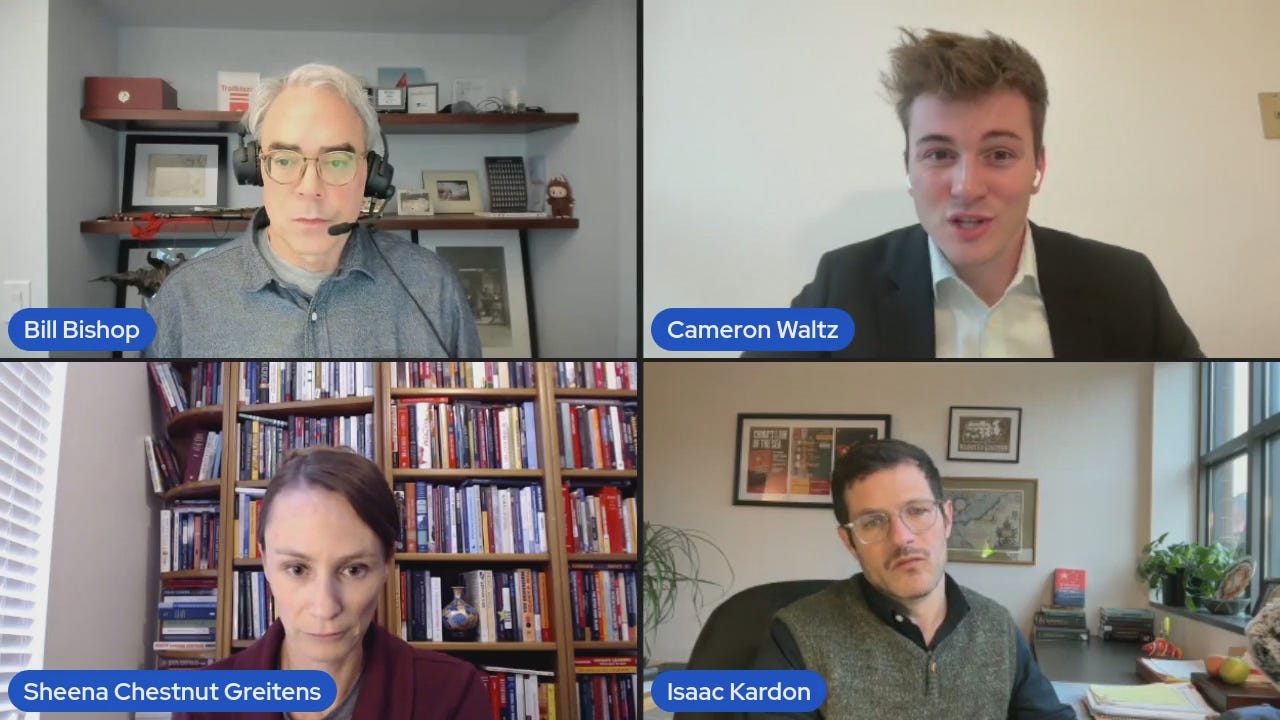
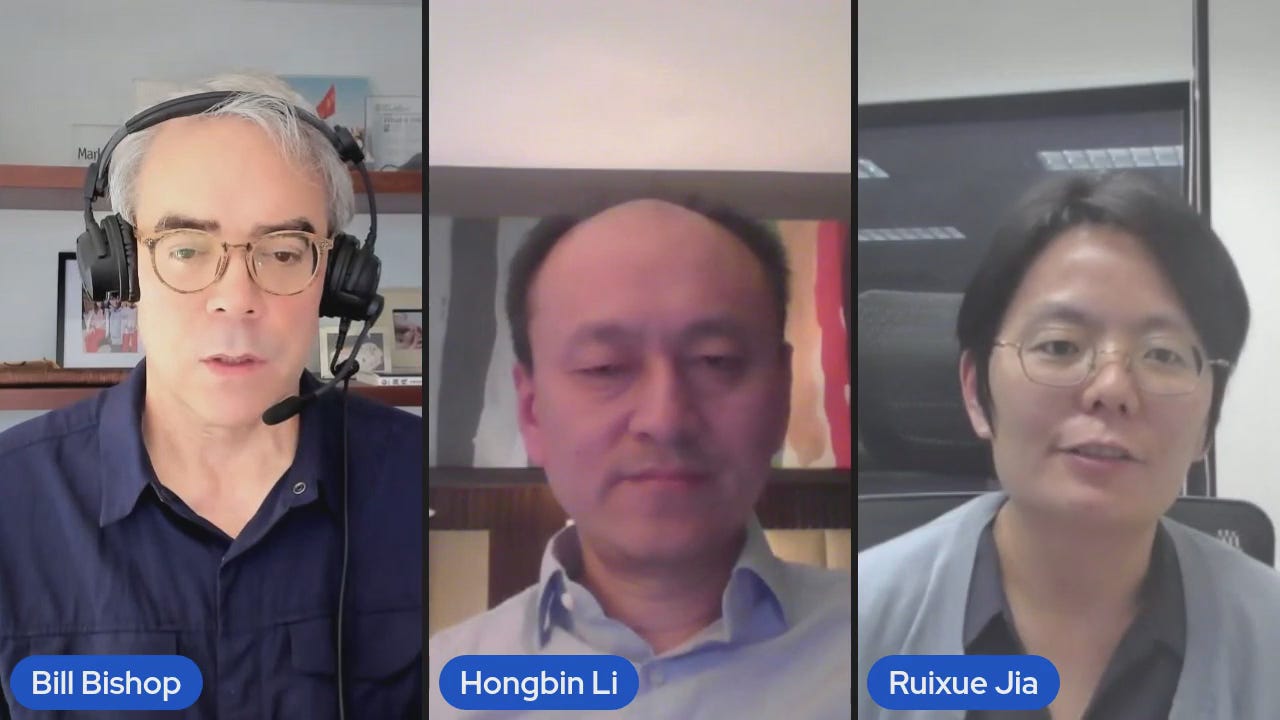
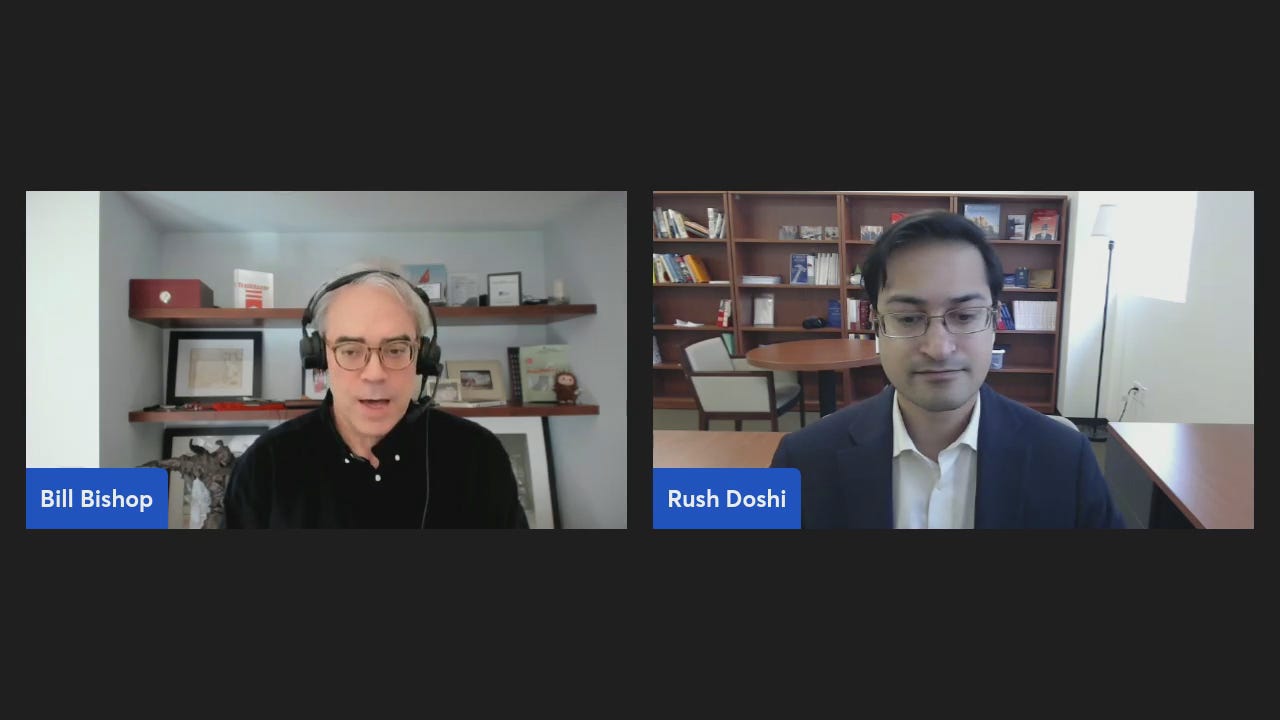
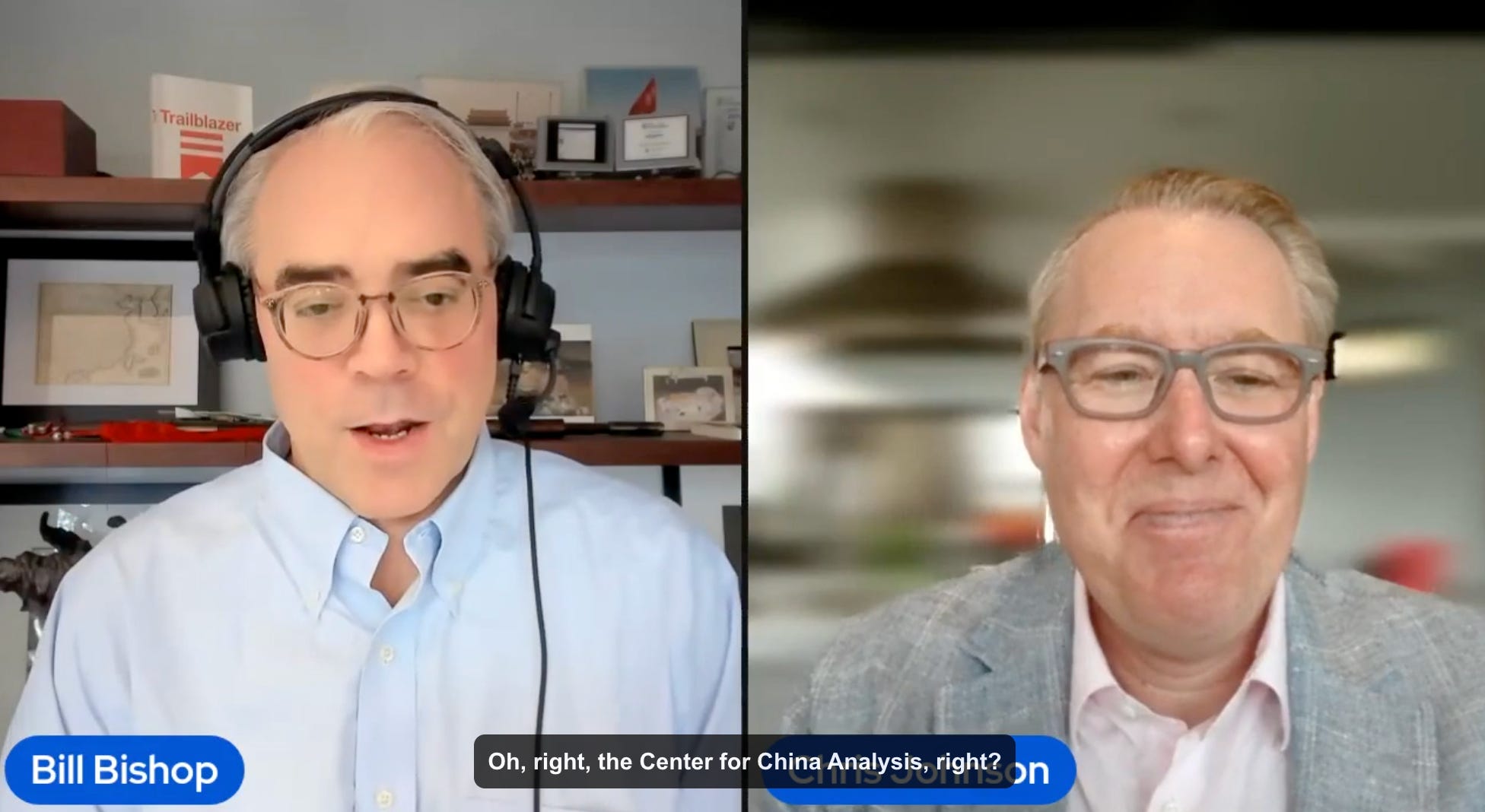
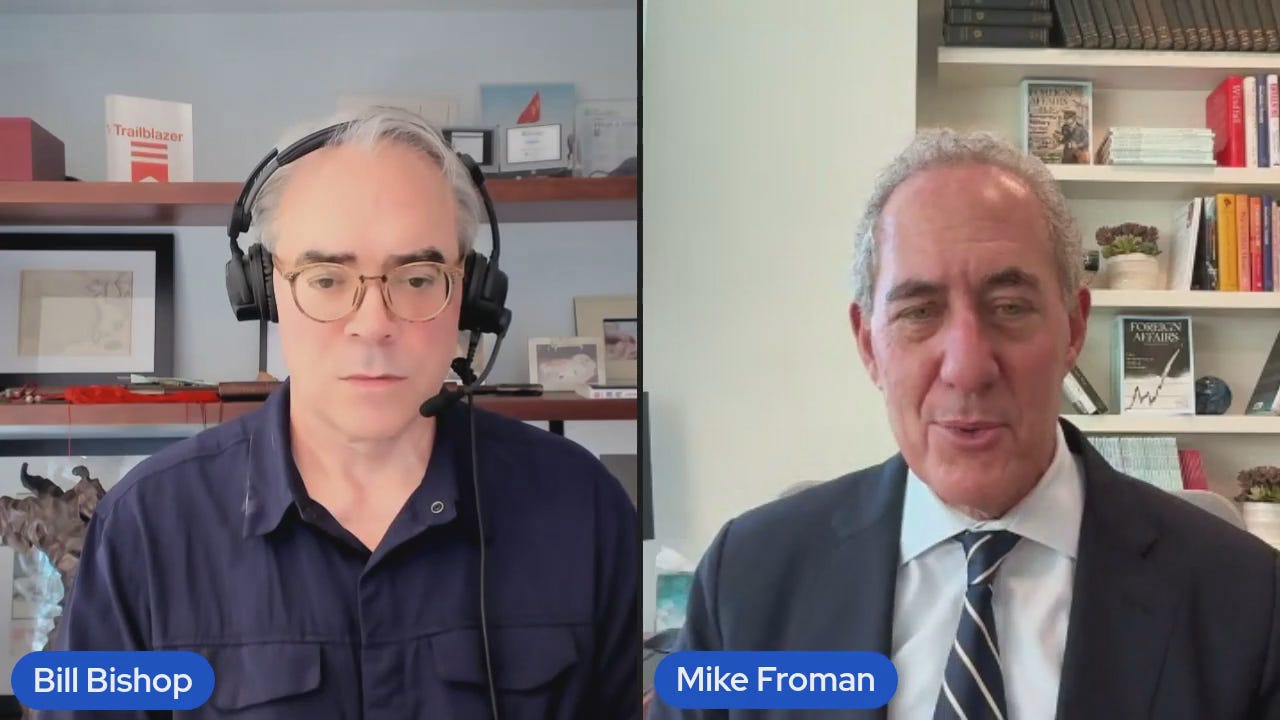
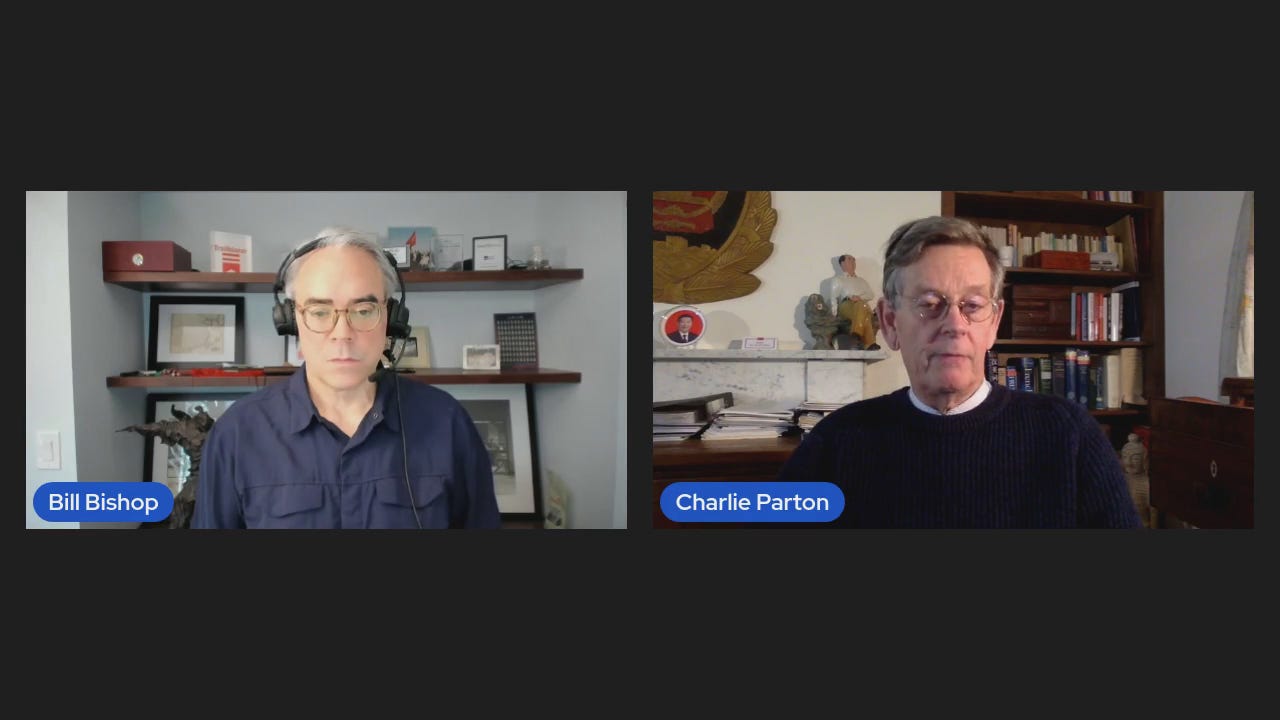
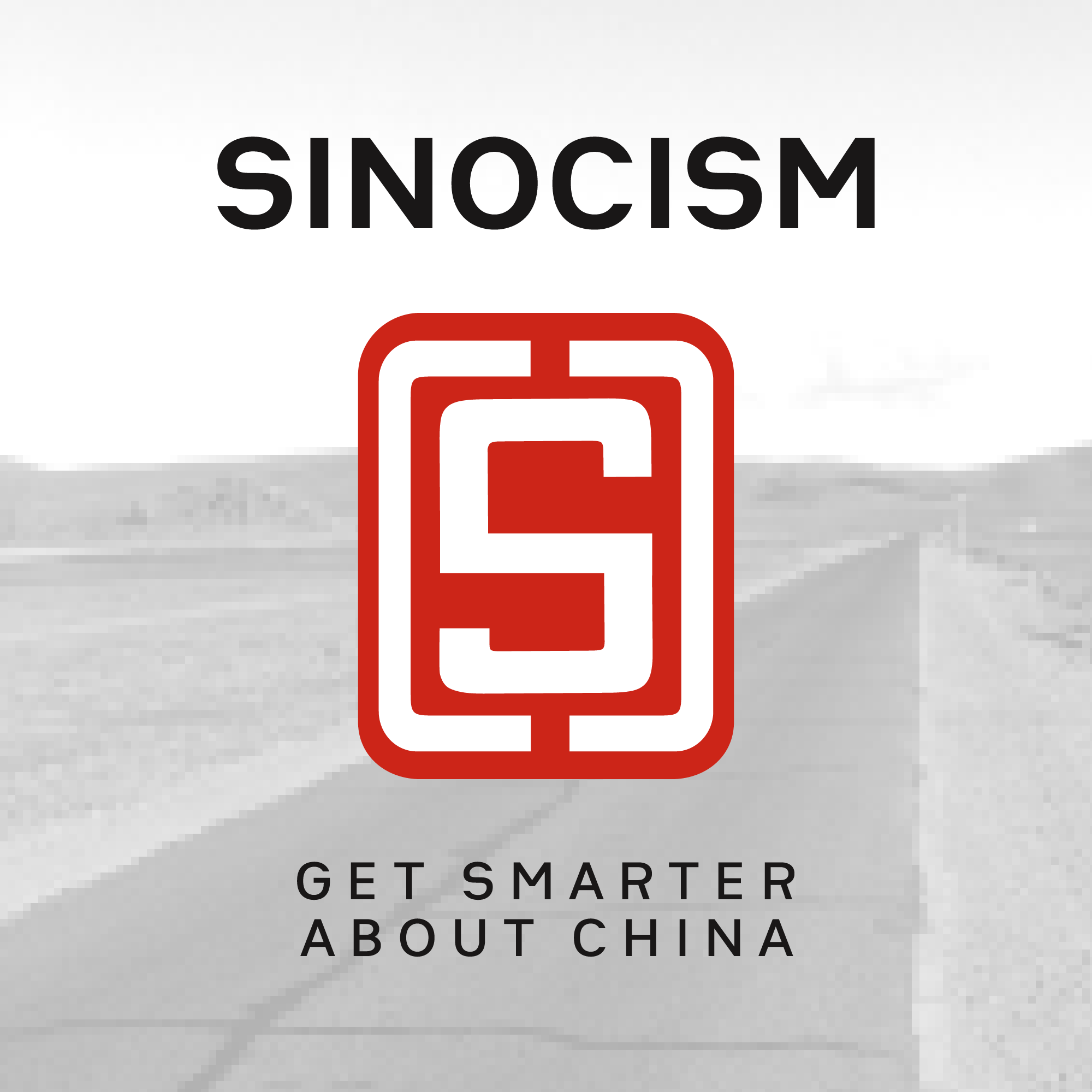
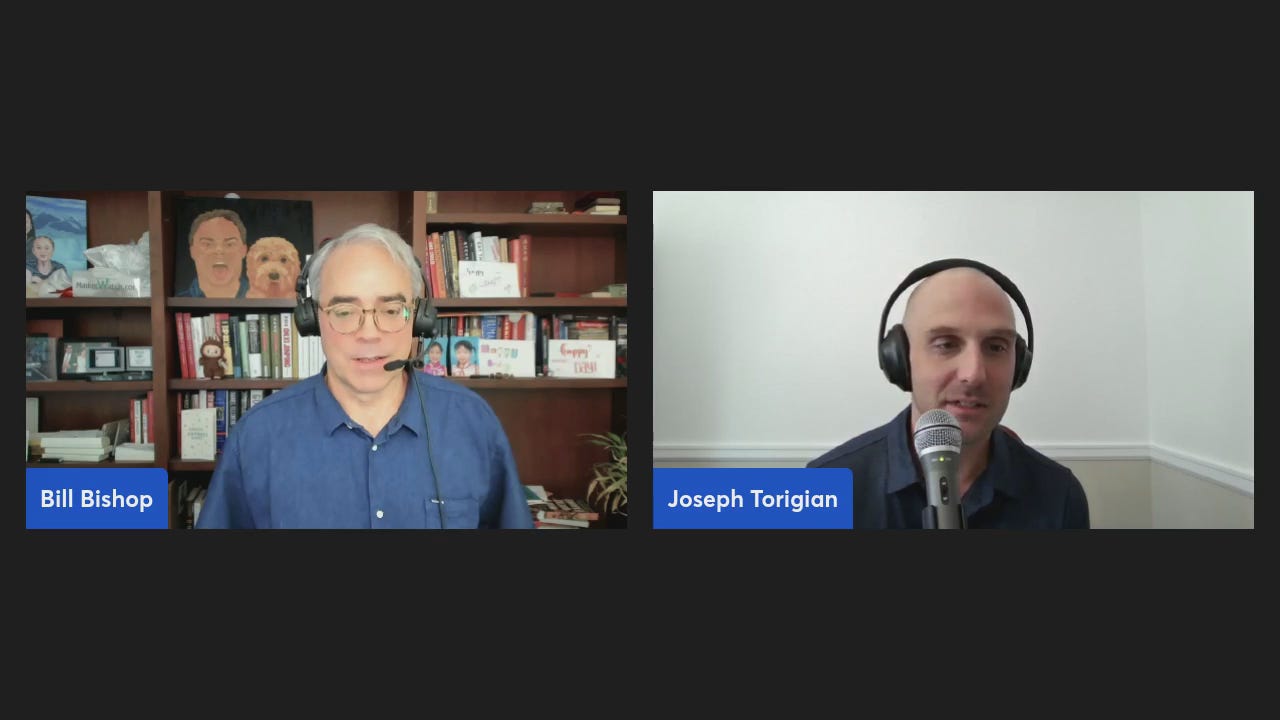
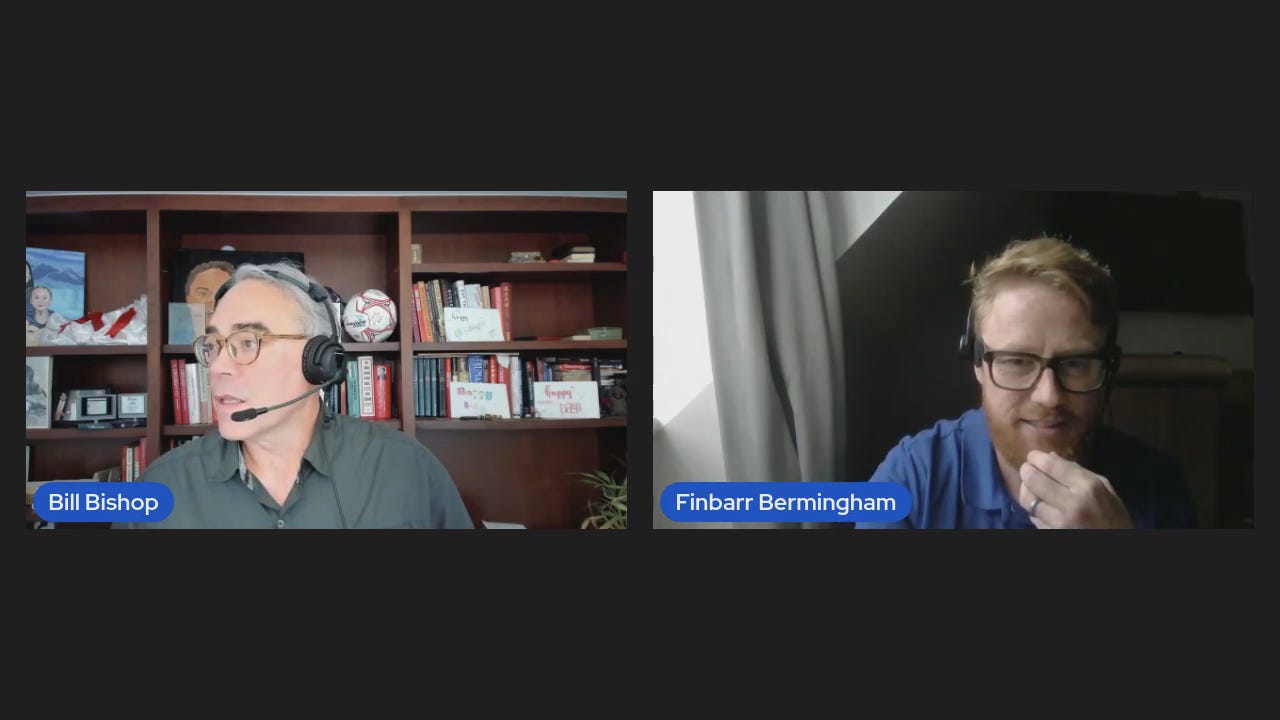
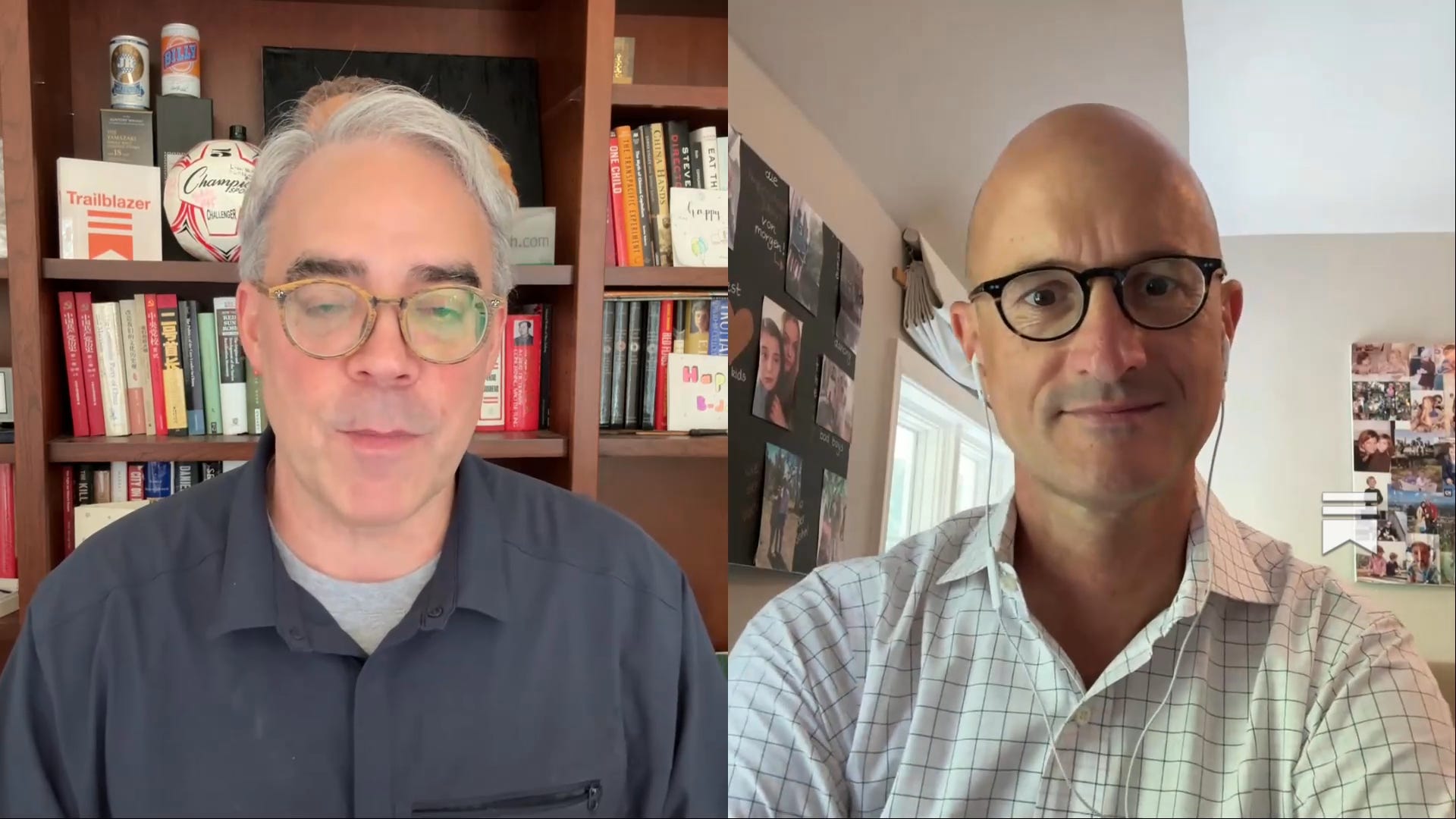


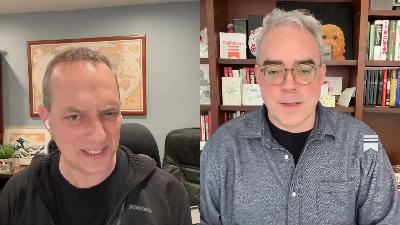


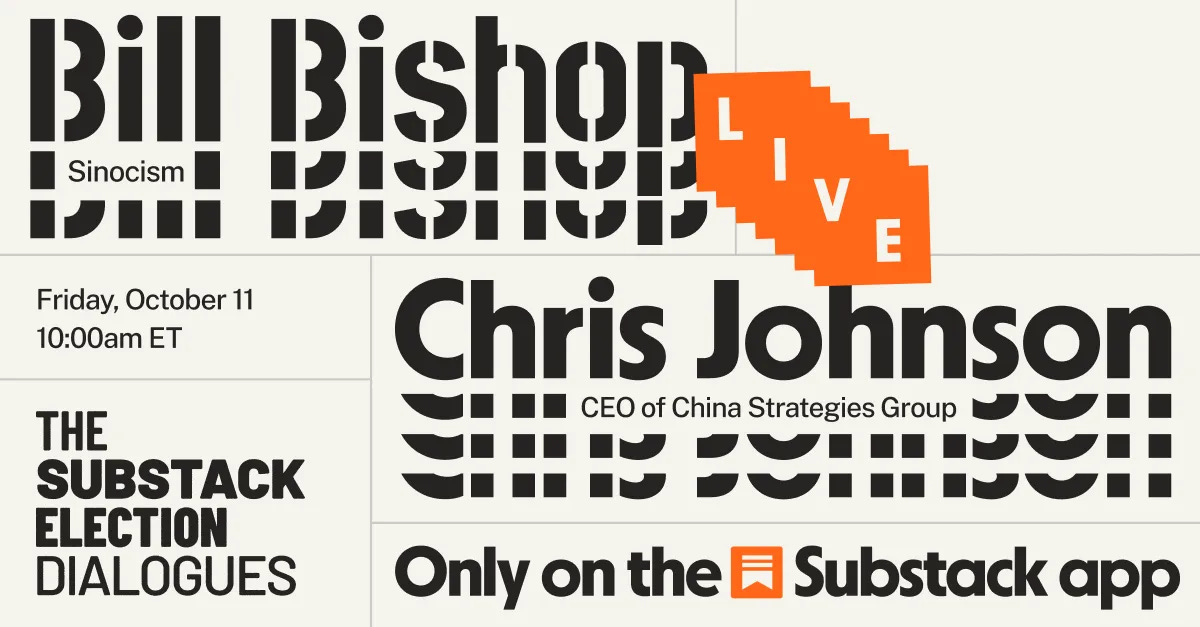

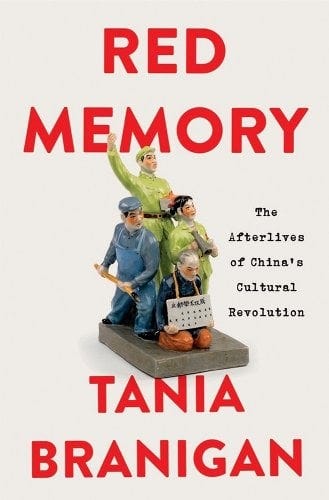
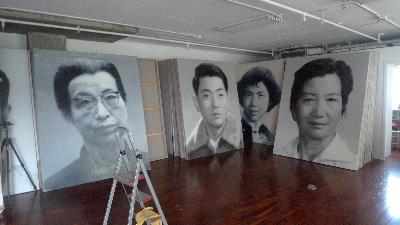



#5: Chris Johnson would sound even more intelligent if he would stop using the phrase "you know" all the time.